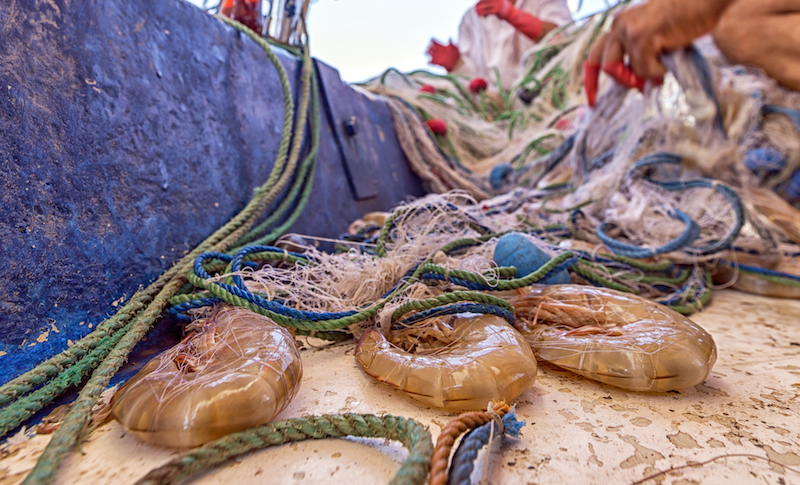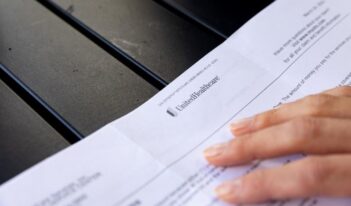
The U.S. government is clamping down on seafood fraud and illegal fishing for shrimp imports.
Did you know that the shrimp on your appetizer plate could be tainted or harvested by slave labor?
The ocean advocacy group Oceana reported that approximately 30 percent of shrimp products in the United States are mislabeled or misrepresented, making it easy for even the most conscientious consumers to purchase shrimp from questionable sources.
The U.S. National Oceanic and Atmospheric Administration (NOAA) is working to reduce the risk of consumers purchasing misrepresented seafood by increasing transparency in the industry. In 2016, the agency finalized a rule establishing the Seafood Import Monitoring Program (SIMP), which bars certain prioritized varieties of seafood from being imported into the United States unless key production information is provided.
Shrimp—the largest U.S. seafood import—is particularly vulnerable to fraudulent activity, and is included among the 13 fish varieties SIMP targets. Still, NOAA delayed SIMP’s requirements for shrimp until earlier this year, citing a need to gather more information on how similar requirements could be imposed on domestically farmed shrimp.
For shrimp products to enter the domestic market under SIMP, producers must obtain an International Fisheries Trade Permit and keep records of each juncture along their supply chains, from when the shrimp was first harvested or produced to when the shrimp is ultimately sold into U.S. commerce. NOAA then collects this production information to enter it into a data portal called the International Trade Data System, a database which amasses U.S. export and import information. SIMP imposes a long list of other information requirements on producers, including identification details on vessels and fishing gear used to harvest the shrimp and records on when, where, and by which entities shrimp are harvested or produced.
For shrimp produced through domestic farming, state regulations already impose certain reporting, permitting, and recordkeeping requirements that could duplicate or contradict SIMP requirements. For this reason, NOAA is in the process of finalizing regulation to impose parallel traceability requirements for domestically farmed shrimp that can work alongside state governance.
Under NOAA’s proposed domestic aquaculture rule, shrimp producers would have to provide the agency with identifying information through an initial registration process, production records on where and when the shrimp are produced along each juncture of the chain of production, and records of production events on a monthly basis. In addition, shrimp farmers would be required to follow existing registration and reporting requirements of their home state. For example, Florida requires aquaculture registration with the Florida Department of Agriculture and Consumer Services each year in addition to NOAA’s recordkeeping requirements.
When NOAA announced that SIMP requirements would come into effect for shrimp this year, some shrimp industry players complained that the compliance timeline was unfairly short compared to the time afforded to producers of other species. “Rushing the shrimp deadline has the potential to be a disruptive force and does not benefit regulators,” said a representative of the National Fisheries Institute. Domestic shrimp farmers might share these sentiments now that they would be subject to similar requirements.
But the regulations have garnered support in the industry as well. The Southern Shrimp Alliance’s executive director, for instance, called NOAA’s efforts “a huge victory for the domestic shrimp industry, American seafood consumers and those who believe that U.S. trade must be legal and fair.”
SIMP and its domestic aquaculture counterpart may not offer a complete solution to combatting fraud and illegal fishing in the shrimp industry. For one, the agency has made clear that its production tracking regulations are not consumer-facing and do not enhance or relate to any seafood labeling requirements imposed on shrimp by the U.S. Food and Drug Administration. Given Oceana’s startling reports on mislabeling of shrimp products, consumers may feel they are better equipped to make informed purchasing decisions by private players like Fishcoin, a company that promises to provide key sourcing information for seafood consumers directly through their mobile devices.
Still, other agencies involved in combatting misrepresentation and deleterious fishing practices in the seafood industry may develop regulations that can build off of the information culled by SIMP and the parallel domestic aquaculture requirements and complement these traceability programs. Particularly, Oceana recommends supplementing traceability requirements with “increased inspection and testing of our seafood” as well as “stronger federal and state enforcement of existing laws combating fraud.”
With expectations that consumer demand for shrimp will only continue to grow in the United States, transparency around both imported and domestically farmed shrimp entering U.S. commerce will be more important than ever in protecting consumers from misrepresented shrimp. SIMP and its domestic aquaculture regulation counterpart represent the nation’s first steps toward this goal.
SIMP’s requirements will become mandatory for foreign shrimp products by December 31, 2018.



